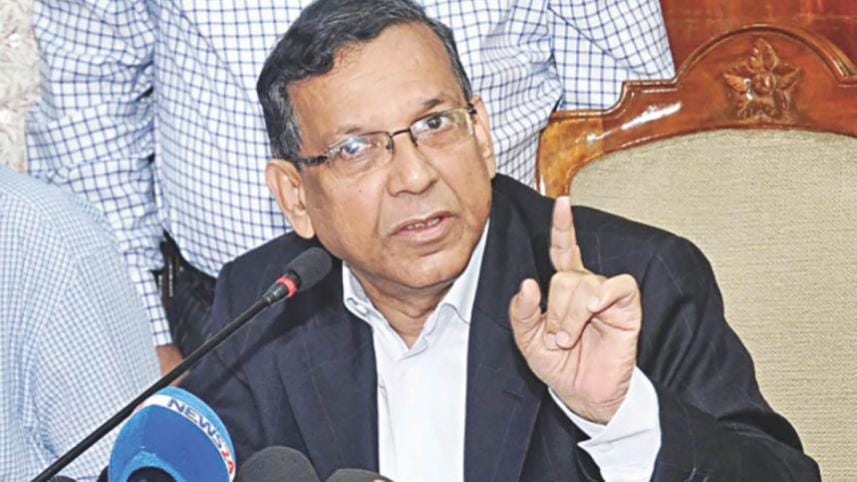‘Anti-state activities’: Jamaat, Shibir to be banned thru executive order

The government has announced that it will ban Jamaat-e-Islami and its student front Islami Chhatra Shibir by today for their alleged involvement in the recent "anti-state activities".
Law Minister Anisul Huq made the announcement yesterday, a day after the Awami League-led 14-party alliance unanimously recommended banning the two organisations.
Speaking to reporters at the Secretariat, the minister said, "The party will be banned through an executive order."
The recommendation for outlawing the two platforms came from a meeting of the 14-party alliance at the Gono Bhaban on Monday night. AL President Sheikh Hasina chaired the meeting.
The Election Commission on October 29, 2018, scrapped the registration of Jamaat, a longtime ally of the BNP, following a High Court verdict that declared Jamaat's registration illegal.
On August 1, 2013, the HC in a landmark verdict declared illegal the Jamaat's registration with the EC. The EC the same year suspended the registration.
Rezaul Haque Chandpuri, then secretary general of Bangladesh Tariqat Federation, along with 24 others filed a writ petition with the HC on January 25, 2009, seeking its order declaring Jamaat's registration illegal.
The petitioners said Jamaat was a religion-based political party, and it did not believe in independence and sovereignty of Bangladesh.
Jamaat later filed an appeal with the Appellate Division of the Supreme Court challenging the HC verdict. The SC upheld the HC verdict declaring Jamaat's registration illegal.
The party secured the registration on November 24, 2008, after making many changes to its charter in line with the EC requirement.
Families of the Liberation War martyrs and war crimes trial campaigners have long been demanding Jamaat be tried as a party for committing crimes against humanity in 1971. Even the war crimes investigators found proof of committing crimes against humanity by the party and recommended charges be pressed against it.
Law Minister Anisul on many occasions had said the government would amend the International Crimes (Tribunals) Act-1973 to try parties. But the act is yet to be amended.
Controversial Islamist thinker Sayyid Abul A'la Maududi founded Jamaat in undivided India under the British colonial rule in 1941.
The government of independent Bangladesh had banned five communal outfits, including Jamaat, which not only opposed the nation's independence but also actively helped Pakistan occupation forces commit genocide and other crimes against humanity.
The banned parties were given the green light to do politics during the rule of late president Ziaur Rahman after the assassination of Bangabandhu Sheikh Mujibur Rahman in 1975.
The international crimes tribunals in their judgments described the Jamaat's role in 1971.
Several top leaders of Jamaat have been executed over committing crimes against humanity during the Liberation War.
Some judgments also said Jamaat played a leading role in creating Pakistan occupation army's auxiliary forces like Al-Badr, Razakar, and Al Shams, and formation of peace committees that actively took part in atrocities against Bangalees.
Jamaat was banned twice before, in 1959 and 1964 in Pakistan, for its communal role.
In 1971, the party took stance against the nation's independence and massacred pro-liberation activists.
Jamaat represented in parliament after its candidates won seats in 1986, 1991, 1996, 2001 and 2008 national elections.
In 2001, BNP-Jamaat formed the four-party alliance government.
The AL, Jamaat, and several other political parties waged a joint movement in 1996 to press home the demand for holding general elections under a caretaker administration.
WHAT JAMAAT SAYS
Protesting the decision to ban the party, Jamaat Ameer Shafiqur Rahman in a statement yesterday said the government's decision is "illegal and unconstitutional".
"Jamaat-e-Islami is an established democratic political party, which has participated in all credible elections in Bangladesh. The party had representatives in parliament," he said.
The Jammat chief said people will not accept the government's decision.
SIX ORGS BANNED SO FAR
Previous governments through executive orders banned five organisations between 2003 and 2009. They are Shahadat-e-Al Hikma (banned in 2003), Jagroto Muslim Janata Bangladesh (2005), Jamaa'tul Mujahedin (2005), Harkatul Jihad Al Islami (2005), and Hijubut Tahrir (2009).
Purbo Banglar Communist Party was also banned for its terrorist and anti-social activities.



 For all latest news, follow The Daily Star's Google News channel.
For all latest news, follow The Daily Star's Google News channel.
Comments